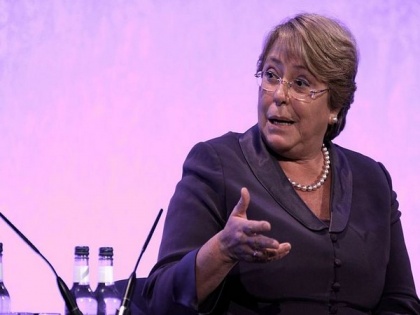China restricting basic freedoms on pretext of national security, says UN Rights chief
By ANI | Published: February 27, 2021 10:03 PM2021-02-27T22:03:37+5:302021-02-27T22:10:13+5:30
As China continues to impose crackdowns on Uyghur Muslims in Xinjiang and people of Hong Kong under the draconian National Security Law, United Nations human rights chief Michelle Bachelet on Friday said that Beijing was restricting basic civil and political freedoms in the name of national security and coronavirus measures.

China restricting basic freedoms on pretext of national security, says UN Rights chief
As China continues its crackdowns on Uyghur Muslims in Xinjiang and people of Hong Kong under the draconian National Security Law, United Nations human rights chief Michelle Bachelet on Friday said that Beijing was restricting basic civil and political freedoms in the name of national security and coronavirus measures.
In her address at the 46th session of the Human Rights Council, Bachelet said that activists, lawyers and human rights defenders - as well as some foreign nationals - face arbitrary criminal charges, detention or unfair trials.
"In China, strong progress has been made over the last year in reducing the prevalence of Covid-19 and its severe impact on the enjoyment of a broad range of human rights. At the same time, fundamental rights and civic freedoms continue to be curtailed in the name of national security and the Covid-19 response," she said.
The Human rights chief added, "Activists, lawyers and human rights defenders - as well as some foreign nationals - face arbitrary criminal charges, detention or unfair trials. In the Hong Kong Special Administrative Region, more than 600 people are being investigated for participating in various forms of protests - some under the new National Security Law."
Bachelet said further that in the Xinjiang Uyghur Autonomous Region, information that is in the public domain indicates the need for independent and comprehensive assessment of the human rights situation.
"My office continues to assess the alleged patterns of human rights violations, including reports of arbitrary detention, ill-treatment and sexual violence in institutions; coercive labour practises; and erosion of social and cultural rights. I am confident that through our ongoing dialogue we will find mutually agreeable parameters for my visit to China," she said further.
The Netherlands Parliament on Thursday passed a motion saying the Chinese treatment of the Uyghur minority is "genocide". The Netherlands becomes the first European country to do so. The motion, which is nonbinding, could encourage other European parliaments to advance similar statements.
Genocide is an internationally recognized crime where acts are committed with the intent to destroy, in whole or in part, a national, ethnic, racial, or religious group.
On Monday, Canada's House of Commons has voted overwhelmingly to declare China's treatment of its Uyghur minority population a genocide. The motion--which passed 266 to 0--was supported by all opposition parties and a handful of lawmakers from the governing Liberal Party.
In the US, the previous Trump administration determined that China has committed genocide against Muslim Uyghurs and other ethnic and religious minority groups in Xinjiang and said that the Chinese Communist Party (CCP) must be held accountable for its acts against humty.China has been rebuked globally for cracking down on Uyghur Muslims by sending them to mass detention camps, interfering in their religious activities and sending members of the community to undergo some form of forcible re-education or indoctrination.
Beijing, on the other hand, has vehemently denied that it is engaged in human rights abuses against the Uyghurs in Xinjiang while reports from journalists, NGOs and former detainees have surfaced, highlighting the Chinese Communist Party's brutal crackdown on the ethnic community,
Meanwhile, China imposed the draconian National Security Law in Hong Kong last year. The law criminalises secession, subversion, and collusion with foreign forces and carries with it strict prison terms. It came into effect from July 1. Since then, a number of former pro-democracy lawmakers have been arrested.
( With inputs from ANI )
Disclaimer: This post has been auto-published from an agency feed without any modifications to the text and has not been reviewed by an editor
Open in app